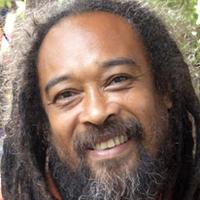Mooji What Is The True Meaning Of Being Still And Without Identity
Dear Mooji,
What is the true meaning of being still
and without identity?
Mooji Answers...
'Should one only witness everything in life without actively participating?
What is the point of existing
if we reject involvement in life?
Is being inert like a stone,
what the Buddha meant,
by being still and avoiding identity?
[Clears throat] Eva' 'Should one only witness everything in life without actively participating?' Active participating
is also witnessed
as a movement.
But who is actually participating?
You must find out, who is participating?
This is just an idea.
When the lungs are breathing,
are you participating?
When the heart is beating,
are you participating?
When someone says,
'Hello, how are you?' and you say, 'Oh, I'm fine,' are you participating?
All these things are coming spontaneously, actually.
But we go further than this,
we say, 'No, I want to do something,' then, that's a kind of effort, and that brings in more the sense that
'I am participating, I am doing something, I must do something,' you see? [Re-reads from the letter:] 'What is the point in existing if we reject involvement in life?' It's a misunderstanding, what you're speaking. [Repeats the question:] 'What is the point in existing if we reject involvement in life?' The one who witnesses,
passively, existence -
the body of that one may be quite active in many respects,
but still inwardly,
they're in total serenity and peace. They're not identified. This would seem like mystery.
Because you think if you're doing something, you have to be passionately doing something.
In fact,
the one who sees knows,
'I am not really doing actually.' This feeling, 'I am doing,' is not strong there.
Simply, activities are going on
in alignment,
and in a sort of harmony of feeling
that they belong to be.
So the sense of being an active doer
is not so strong, you see?
[Re-reads from the letter] 'Is being inert like a stone, what the Buddha...', you've got to be joking, of course. 'Is being inert like a stone, what the Buddha meant, by being still and avoiding...' He, himself, was not
inert like a stone.
Centuries later when they made stone Buddhas
then some stone Buddhas were inert like stone.
The Buddha is not a stone.
He is the only living
True Being.
And the Buddha moved about,
spoke, had feelings,
and love, compassion, and joy
- in a way so purely -
that for thousands of years
other human beings
have been trying to emulate
the purity of expression
and love that emanated out of this Being,
the One who realized the Truth.
There's nothing stagnant about that. There's nothing sterile about it. It is pure!
And purity and sterility are very different things.
Purity and sterility are very different.
The mind and wrong thinking is thinking that,
'Oh, you must be very quiet and look like this,' this is nonsense.
The one who has realized the Truth is the most natural
because they are not trying to pretend,
they are not trying to solicit anything,
they are not trying to
convince you.
They don't want anything from anything at all knowing that all things
are serving the Truth!
What can another mortal give them?
If you want to say that.
Their minds are not working like that.
And it's better you bring your own mind into alignment with that understanding.
Presently, it's, many misunderstandings. [Reads again from the letter] 'Should one only witness everything in life without actively participating?' The active participation
is coming as an idea from the mind.
You're here. You are life.
It's not you living life. You are the life, itself,
manifesting in this body.
Some moment, in this body, it is sleeping,
and another moment it's up and climbing a tree. And you don't know, do you know how you're gonna wake up feeling tomorrow? you do not know.
You don't even know if you're going to wake up. So, why be troubled about all these things?
One who is free
is completely natural in all ways.
They're not trying to be natural, they're not even thinking 'natural,' but their thinking is natural.
You see? If there are thoughts, they come.
They're not fighting with any thought. They've understood what thoughts are, and they understand what they are.
They know, 'I am the witness of them.' And it's a very gentle seeing. Most natural.
And, if they have a wish,
it is that all sentient beings come to this understanding
because they know the joy,
the love,
the compassion,
the unicity of that seeing.
And they want to share it with the world.
But not out of panic and,
like this.
Very good.
"The one who passively witnesses all, is One who is in total serenity and peace..."

